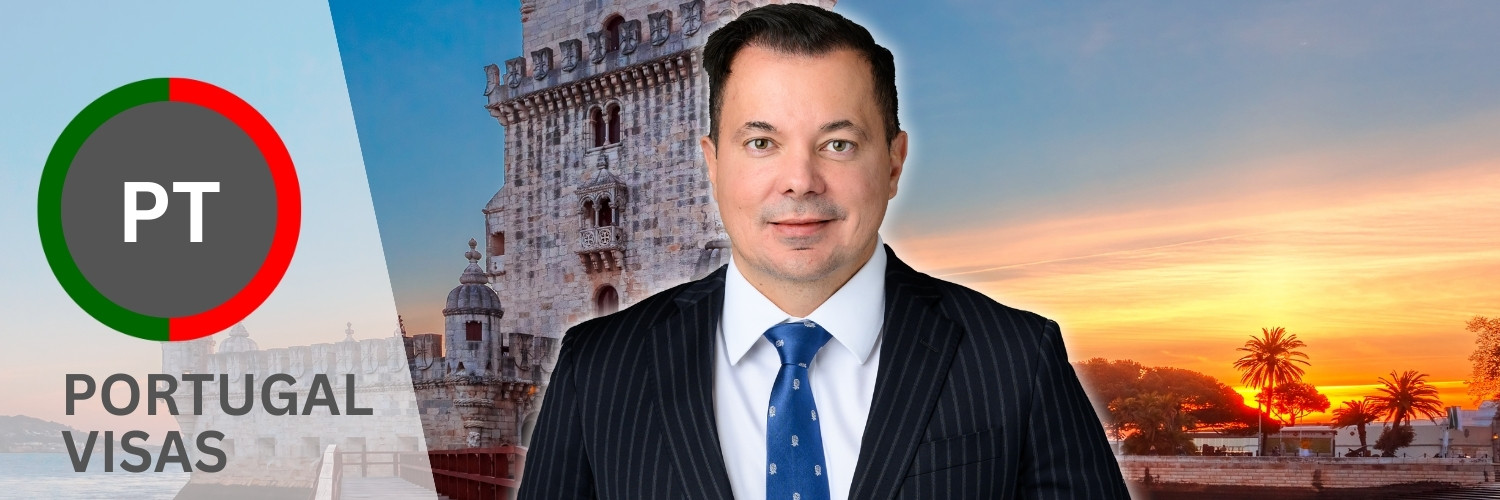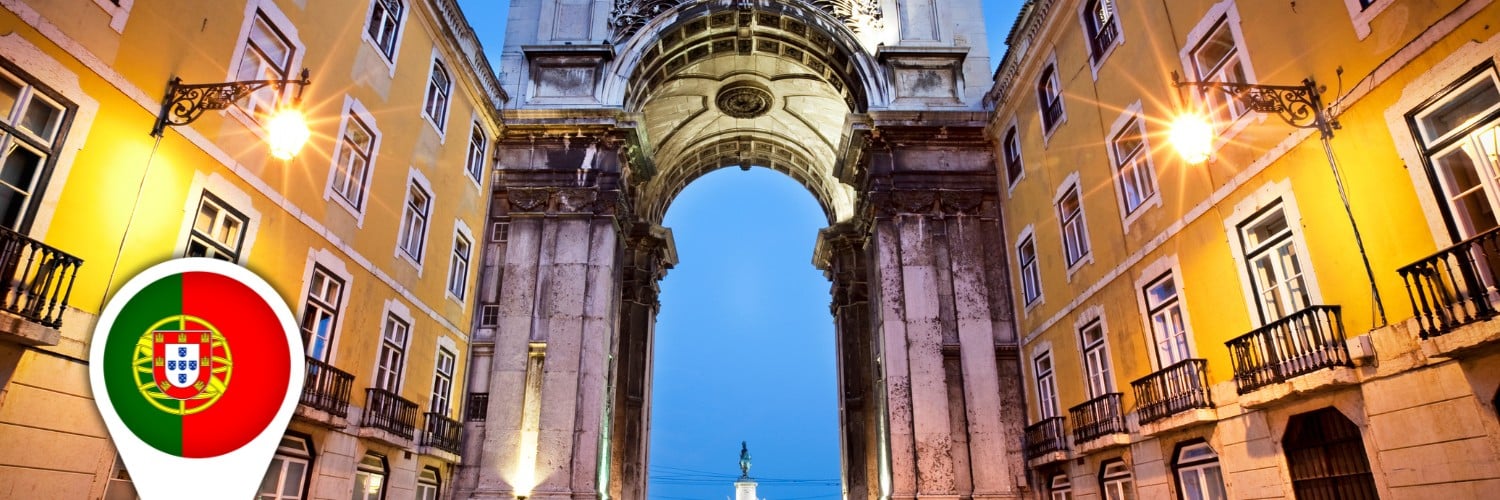Portugal Visas

Portugal, with its rich history, vibrant culture, and stunning landscapes, has become a top destination for US citizens looking to travel, invest, or relocate. Whether you are seeking a temporary stay as a tourist, aiming to establish residence through investment, or planning to retire in a serene environment, understanding the various Portuguese visa options is crucial.
Portugal Entrepreneur Visa
Portugal's entrepreneur visa allows most business people to secure residency in Portugal.
Portugal Retirement Visa
Got any type of retirement income? Get the retirement visa in Portugal! No minimum age.
Portugal Passive Income Visa
Got passive income? No need to invest to secure the Portuguese residency!
Portugal Digital Nomad Visa
Have the entire Europe at your doorstep as a digital nomad! Start your journey now.
Portugal Technology Visa
Tech job visa allowing a fast track to qualified technology workers from non-European countries.
Portugal Golden Visa
Buy your way into permanent residency and citizenship in Portugal via investment.
Portugal Job Seeker Visa
Come legally to work in Portugal via one of the most amazing visas in Europe today.
How to Get Portuguese Citizenship
Portuguese citizenship by descent, marriage, and time of residency in Portugal.
Portugal Family Reunion Visa
Get qualifying relatives in Portugal. Good for spouses, children, and - potentially - even parents!
Portugal Student Visa
Studying in Portugal for 5 years can get you permanent residency and even citizenship!
Why Portugal?
Portugal offers a unique blend of traditional charm and modern living. Its high quality of life, combined with relatively low living costs compared to the US, makes it an appealing choice for Americans. From the sun-drenched beaches of the Algarve to the historic streets of Lisbon and Porto, Portugal provides a diverse setting that caters to a variety of lifestyles and preferences.
Visa Options Overview:
For US citizens, Portugal offers several visa options depending on the purpose and duration of the stay:
- Tourist Visas allow short visits up to 90 days for leisure or business without the need for a visa application beforehand, thanks to the visa waiver agreement between the US and the EU.
- Residency Visas, including the Golden Visa, D7 (Passive Income Visa), and D2 (Entrepreneur Visa), offer opportunities for those looking to stay longer, invest, or retire in Portugal.
- Work Visas are available for those who have secured employment in Portugal, facilitating not only a move but also integration into the Portuguese job market.
- Study Visas provide access to Portugal’s educational system for students wishing to take courses or engage in research at Portuguese institutions.
Each visa category has specific requirements and benefits, tailored to fit the diverse needs of individuals and families moving from the US to Portugal. Understanding these options will help streamline your planning process and ensure a smooth transition to life in Portugal.
US Citizens Don’t Need a Tourist Visa
Visa-Free Travel:
US citizens benefit from visa-free entry into Portugal and the broader Schengen Area for short stays up to 90 days within a 180-day period. This privilege makes Portugal an accessible destination for tourism, short business trips, or family visits. During this period, travelers can move freely within the Schengen zone, which enhances the travel experience by allowing easy access to multiple European countries during a single trip.
Activities Covered:
The visa-free entry allows a variety of activities such as sightseeing, experiencing local festivals, attending business meetings, or short study courses. It is important for US tourists to ensure that their activities do not extend beyond what is permitted under the visa-free rules, such as engaging in employment.
Requirements and Considerations:
To enter Portugal visa-free, US citizens must have a passport that is valid for at least three months beyond their planned departure date from the Schengen Area. Although a visa is not required for short stays, it is advisable to have travel insurance covering medical expenses and repatriation, although this is not a mandatory requirement.
Planning Longer Stays:
For stays longer than 90 days, a long-term national visa may be required depending on the purpose of the extended stay, such as pursuing longer academic courses or participating in long-term business projects. This will involve a different application process, requiring documentation and possible appointments at a Portuguese consulate or embassy prior to departure.
Cultural Tips for Visitors:
While visiting, US citizens will find that English is widely spoken in major cities and tourist areas, making communication relatively easy. However, learning a few basic phrases in Portuguese can enhance interactions with locals and show respect for the culture. Portugal is known for its warm hospitality, rich maritime history, and vibrant culinary scene, offering a wealth of experiences for every traveler.
Portugal Golden Visa for US Citizens
Overview of the Golden Visa Program: The Portugal Golden Visa is a residency-by-investment program that offers non-EU citizens, including US investors, the opportunity to obtain a residence permit in Portugal through significant financial investment. This program is particularly attractive due to its flexibility and the benefits it offers, which extend to the investor’s family members.
Investment Options: The Golden Visa program requires an investment into the Portuguese economy. Historically, popular options included real estate purchases and capital transfers, but recent changes have adjusted eligible investment types to encourage investments in specific sectors such as research, environmental projects, job creation, and more. US citizens interested in this program should consult updated guidelines or a qualified immigration attorney to understand which investment options qualify as of the latest regulations.
Residency Benefits: Upon making the qualifying investment, investors and their families can receive a temporary residence permit. This permit allows for freedom of travel within the Schengen Zone and only requires the holder to spend an average of seven days per year in Portugal, making it highly appealing for those who travel frequently or reside in multiple countries.
Pathway to Citizenship: One of the most significant advantages of the Golden Visa is its pathway to Portuguese citizenship. After five years of maintaining the investment and fulfilling minimal residency requirements, investors may apply for permanent residency and citizenship, subject to meeting certain criteria such as basic proficiency in Portuguese language and clean criminal records.
Application Process: The application process involves several steps, including making the investment, completing the necessary paperwork, and submitting the application through the Serviço de Fronteiras e Estrangeiros (SEF) or a designated legal representative. The process typically requires professional legal assistance to ensure compliance with all regulations and to streamline the numerous administrative procedures.
Considerations for US Citizens: US investors considering the Golden Visa should be aware of the potential tax implications both in Portugal and the United States. Engaging with a tax advisor who is knowledgeable in the tax treaties and laws of both countries is crucial to optimize financial outcomes and ensure compliance.
This section of the guide is designed to provide US citizens with an understanding of the Portugal Golden Visa, highlighting its benefits and the commitment required. It’s an excellent option for those looking to enjoy the lifestyle and benefits of living in Europe while maintaining the flexibility to travel or reside outside of Portugal.
D7 Visa (Passive Income Visa) for US Citizens

Overview of the D7 Visa: The D7 Visa, commonly referred to as the Passive Income Visa or Retirement Visa, is designed for non-EU citizens who have a regular, stable passive income. This visa is especially popular among retirees and remote workers from the US who wish to live in Portugal and enjoy its favorable climate and relaxed lifestyle.
Eligibility Requirements: To qualify for the D7 Visa, applicants must demonstrate that they have sufficient passive income to support themselves during their stay in Portugal. This income can come from various sources, including pensions, rental incomes, investments, or other provable passive revenues. The minimum income requirement is typically aligned with the Portuguese minimum wage and may be adjusted based on the number of dependents included in the application.
Benefits of the D7 Visa: Holders of the D7 Visa are allowed to reside in Portugal and have access to the Portuguese healthcare and education systems. The visa initially grants a temporary residence permit, which can be renewed and eventually lead to permanent residency and citizenship after five years, provided the holders meet all the residency requirements.
Application Process: The application process for the D7 Visa involves gathering necessary documentation to prove income stability and submitting an application through the Portuguese Consulate or Embassy in the US. Applicants will need to show proof of income, proof of accommodation in Portugal, and comprehensive health insurance. The process may also require an interview and submission of biometric data.
Living in Portugal on a D7 Visa: Once approved, D7 Visa holders can enjoy the benefits of living in Portugal, including participation in local culture and communities. The visa requires the holder to spend at least 16 months in Portugal during the first two years and not be away for more than six consecutive months to maintain the validity of the visa.
Access now our Complete Guide on the D7 Portugal Passive Income Visa. This guide provides US citizens with critical information about the D7 Visa, highlighting how it caters to individuals with passive income desiring to relocate to Portugal. Note that the D7 visa is also known as the Portugal Retirement Visa since it also allows retirees to secure it based on retirement income.
Digital Nomad Visa (D8 Visa) for US Citizens

Overview of the Digital Nomad Visa: Introduced in October 2022, the Digital Nomad Visa, also known as the D8 Visa, allows non-EU remote workers and freelancers to live and work in Portugal. This visa is designed for individuals who earn income from non-Portuguese sources, providing an ideal way for US citizens involved in remote work to enjoy living in Portugal while continuing their professional activities.
Eligibility Requirements: To be eligible for the Digital Nomad Visa, applicants must demonstrate a stable and substantial remote income. The required minimum income is four times the Portuguese minimum wage, which in 2024 translates to approximately $3,524 (€3,280) per month. Applicants must provide evidence of this income, typically through tax returns, payslips, or contracts.
Benefits of the Digital Nomad Visa: The Digital Nomad Visa offers a unique blend of flexibility and access, allowing remote workers to reside legally in Portugal, benefit from its socio-economic environment, and travel within the Schengen Area. Holders of this visa can apply for a temporary stay visa valid for one year or opt for a residency permit extendable up to five years, subject to meeting renewal requirements.
Application Process: You must submit proof of income, a valid passport, health insurance covering your stay in Portugal, and evidence of accommodation. The process generally starts at a Portuguese consulate or embassy in the US and involves several stages of documentation verification.
Living in Portugal as a Digital Nomad: Portugal offers an appealing environment for digital nomads, with a high quality of life, advanced internet infrastructure, and a variety of coworking spaces. Cities like Lisbon, Porto, and the Madeira archipelago are especially popular among remote workers due to their vibrant communities and supportive ecosystems for digital nomads.
Access now our Complete Guide on the Portugal Digital Nomad Visa.
D2 Visa (Entrepreneur Visa) for US Citizens

Overview of the D2 Visa: The D2 Visa, also known as the Entrepreneur Visa, is tailored for non-EU citizens who wish to establish a business in Portugal. This visa option is ideal for US entrepreneurs looking to tap into the European market through Portugal’s growing and supportive startup ecosystem.
Eligibility Requirements: To be eligible for the D2 Visa, applicants must present a solid business plan that is viable and beneficial to the Portuguese economy. This plan must demonstrate potential for job creation or technological advancement. Applicants must also prove they have sufficient financial resources to establish and operate the business, as well as support themselves.
Benefits of the D2 Visa: The D2 Visa offers the opportunity to live and work in Portugal, leading to potential permanent residency and citizenship. It also allows visa holders to bring their family members under family reunification provisions. Additionally, establishing a business in Portugal can provide access to the broader European market.
Application Process: The application process involves submitting the detailed business plan, proof of financial means, and evidence of business experience or entrepreneurial background to the Portuguese consulate or embassy. The process may include an assessment of the business’s economic viability by local trade and investment agencies.
Operating a Business in Portugal: Portugal offers a strategic location, a skilled workforce, and supportive government policies for startups and small businesses, making it an attractive environment for US entrepreneurs. Networking with local business communities and potentially qualifying for various grants or incentives are also significant advantages.
Additional Considerations for US Citizens: US entrepreneurs should be aware of the legal and tax implications of opening a business in a foreign country. Consulting with legal and financial advisors who specialize in Portuguese and international law is crucial. Understanding the cultural business practices and integrating into the local market are also important for the success of the venture.
D3 Visa (Highly Qualified Activity Visa) for US Citizens
Overview of the D3 Visa: The D3 Visa is designed for highly skilled non-EU citizens seeking to engage in high-level professional activities in Portugal. It targets individuals who can contribute significant expertise to the Portuguese economy, particularly in scientific, technological, or intellectual sectors.
Eligibility Requirements: Applicants for the D3 Visa must possess qualifications or professional experience of exceptional quality that is recognized and in demand in Portugal. This typically includes holders of advanced degrees or those with a distinguished career in relevant fields. Applicants must secure a job offer or employment contract from a Portuguese company or demonstrate significant professional achievements.
Benefits of the D3 Visa: The D3 Visa provides a pathway to temporary residency in Portugal, which can be renewed and lead to permanent residency and citizenship after five years, under certain conditions. Holders can also bring their families to Portugal under the family reunification provisions. This visa facilitates access to a stable and rewarding professional environment within the EU.
Application Process: The application process for the D3 Visa involves submitting a valid employment contract or offer from a Portuguese employer, proof of qualifications, and documentation of professional experience. The application is typically processed by the Portuguese consulate or embassy in the applicant’s home country. Approval depends on the demonstration of the applicant’s ability to contribute to the Portuguese economy significantly.
Living and Working in Portugal: Portugal offers a competitive environment for highly skilled professionals, with opportunities for career development in various industries. The country’s location within Europe makes it an excellent base for international business and travel. Additionally, the quality of life, cultural richness, and supportive expat community make Portugal an attractive destination for professionals and their families.
Additional Considerations for US Citizens: US citizens applying for the D3 Visa should consider the implications of tax and social security contributions in Portugal. It’s advisable to consult with financial and legal experts to understand the full scope of these obligations. Additionally, adapting to the local business culture and language can significantly enhance professional interactions and integration into the community.
D1 Visa (Work Visa) for US Citizens
Overview of the D1 Visa: The D1 Visa, commonly referred to as the Work Visa, is designed for non-EU citizens, including US citizens, who have secured employment in Portugal. This visa facilitates the legal entry and residence of individuals coming to Portugal for professional work.
Eligibility Requirements: To be eligible for a D1 Visa, applicants must have a formal job offer from a Portuguese employer. The job offer must meet certain salary and labor conditions to ensure it aligns with national employment standards. Applicants are typically required to possess qualifications or skills pertinent to the job role.
Benefits of the D1 Visa: The D1 Visa grants the holder the right to live and work in Portugal, contributing to their field of expertise. It also allows for easier access to the Portuguese social security and healthcare systems, along with other social benefits. Additionally, holders of the D1 Visa can apply for family reunification, allowing their family members to join them in Portugal.
Application Process: The application process for the D1 Visa involves submitting the employment contract, a valid passport, proof of accommodation in Portugal, and a clean criminal record. The application must be lodged at the Portuguese consulate or embassy in the applicant’s home country. Approval of the visa will depend on the labor market needs and the qualifications of the applicant.
Living and Working in Portugal: Portugal offers a dynamic and growing economy with opportunities in various sectors such as technology, tourism, and manufacturing. The country provides a supportive environment for expatriates, including a rich cultural heritage, a high quality of life, and a competitive employment market.
Additional Considerations for US Citizens: US citizens should be aware of the potential tax implications of working in Portugal. Understanding the bilateral tax treaty between the US and Portugal is crucial to managing tax liabilities effectively. Additionally, integrating into the Portuguese work culture and learning the language can enhance professional relationships and personal life in Portugal.
Portugal Student Visa for US Citizens

Overview of the Student Visa: The Portugal Student Visa is designed for non-EU/EEA students, including those from the US, who wish to undertake studies in Portugal. This visa facilitates the legal entry and residence of students enrolled in Portuguese educational institutions.
Types of Student Visas: There are two main types of student visas for Portugal:
- Short-term Student Visa (Type C): For studies, training, or internships lasting up to three months.
- Long-term Student Visa (Type D): For academic or research activities that exceed three months, such as undergraduate, graduate, or doctoral programs.
Eligibility Requirements: Applicants must have an acceptance letter from a Portuguese educational institution and provide proof of sufficient funds to cover their stay in Portugal. Additionally, they need to show that they have accommodation arranged and health insurance that covers their period of stay.
Benefits of the Student Visa: Holders of the Portuguese Student Visa can legally study in Portugal and have access to student services and facilities. The visa also permits limited work hours per week during term time, allowing students to gain work experience while studying.
Application Process: The application process involves submitting the acceptance letter, proof of financial means, accommodation details, and a valid health insurance policy. Students applying for the long-term visa may also need to undergo a pre-arrival interview at the nearest Portuguese consulate or embassy in the US.
Living and Studying in Portugal: Portugal offers a rich educational experience with a variety of high-quality programs in areas ranging from the humanities to science and technology. The country’s diverse culture, history, and modern academic resources make it an attractive destination for international students.
Additional Considerations for US Citizens: It’s important for US students to be aware of the visa expiration and renewal requirements to avoid any legal complications. Engaging with the international students’ office at their chosen Portuguese university can provide ongoing support and guidance throughout their studies.
Conclusion: Exploring Portugal’s Visa Options

Summarizing Visa Opportunities: Portugal offers a diverse array of visa options catering to different needs, from tourists and students to entrepreneurs and retirees. Each visa category is designed to facilitate a specific type of stay, whether it’s for short-term travel, long-term residence, or investment purposes. For US citizens looking to experience life in Portugal, understanding the nuances of each visa type is crucial for a successful application and integration into Portuguese society.
Encouraging Proactive Engagement: Prospective applicants should thoroughly research their desired visa type and prepare their application meticulously to meet all stated requirements. Engaging with Portuguese consular services in the US, or consulting with legal and immigration experts, can provide clarity and increase the likelihood of a successful application.
Emphasizing the Benefits of Portuguese Residency: Living in Portugal not only offers a high quality of life, rich cultural experiences, and a warm climate but also provides strategic benefits such as access to the wider European Union. Whether the goal is to study, work, or retire, Portugal offers a welcoming and vibrant environment for Americans.
Final Thoughts: We hope this guide provides a comprehensive overview of Portugal’s visa types and the opportunities they offer. We encourage US citizens to consider what Portugal has to offer and take the steps needed to explore this beautiful country more deeply.



